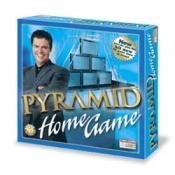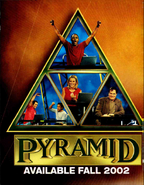| Aired | |
| Syndicated, September 16, 2002 - May 21, 2004 | |
| Number of episodes | |
| 315 | |
| Run time | |
| 30 Minutes | |
| Host | |
| Donny Osmond | |
| Announcer | |
| John Cramer | |
| Origination | |
| Sony Pictures Studios, Culver City, California | |
This is chronicling the 2002 version of Pyramid, produced by Sony Pictures Television. According to the promo, it claims that "Once you start watching, you can't stop playing".
Game Format[]
Main Game[]
Two teams, each consisting of a celebrity guest and a studio contestant, attempted to guess a series of items relating to different categories within a short time limit based on clues given by their partners.
The game consists of six categories, each one cleverly written in order to give team members a vague idea of what it was about (ex: "Loosen Up" - things that are stiff; "Made Public" - things that are used by the public; "The Woodsman" - things that a carpenter uses). Some categories also involved famous people, which contestants and celebrities both dreaded. Each team played each category in alternating order (their choice), and for each category, one person on the team had 20 seconds to describe six items relating to that category to their partner. Teams scored 1 point for each correct answer (for a maximum of 6 points); if they passed on a word, they could come back to it if time permitted. The clue giver could use voice inflections and hand/body movements while describing a word, but they could not say the actual word or any other part of it or else they would lose out on that potential point score (accompanied by a "burble" sound effect). For the first two categories, the celebrities gave the clues, then the contestants gave the clues for the next two, and then for the final two, teams decided amongst themselves who would give or receive clues (the team that was trailing usually got first pick between the last two categories). The team in the lead after the sixth category moved on to the Winner's Circle.
Super Six[]
In each half of the show, there was a bonus card hidden behind one of the six categories on a board and for the team that uncovered it, the contestant partner had a chance to win a bonus prize which would be theirs to keep whether they won the game or not. Of course, to win the bonus, the team had to get all 6 answers right. In situations where a team didn't all 6 points to win on the very last category or they won the game automatically, if the very last category concealed the bonus card, the team was allowed to play the category all the way out to try and win the bonus prize. During the second season, home viewers who registered on the Pyramid website could win the prize offered if the contestant won it.
Tie-Breakers[]
If the game ended in a tie, the game shifted into a tie-breaker situation. The team that caused the tie had a choice between two letters leaving the other for the other team. Both teams had 30 seconds to get as many of the six items beginning with their letter(s) as they can. The teams continued building on their scores using the tie-breaker categories. As soon as the tie was broken, the game was over.
Winner's Circle[]
The Winner's Circle essentially reversed the process: one member of the winning team had 60 seconds to describe six categories of increasing difficulty to their partner by listing items relating to each category. Contestants always had the option of whether they wanted to give or receive clues in the Winner's Circle, but celebrities usually gave the majority of the time. The clue receiver had to say verbatim what the category was. Regardless of who gave the clues, there were strict rules involving the types of clues players could not give in the Winner's Circle (see below):
- Clue givers could not use their hands (their chair had special straps attached to the arms to prevent them from doing so)
- Clue givers could not give away any part of the category itself
- Clue givers had to use a short and concise list of clues; they could not use clues that were overly descriptive
- Clue givers could not use synonyms or prepositional phrases
- Clue givers' clues had to relate to the category itself
If the clue giver gave an illegal clue at any time, the category in play was thrown out, thus disqualifying the contestant from winning the grand prize. However, if this happened with time left on the clock and with unrevealed categories yet to be played, then the team was allowed to play the remainder of the Winner's Circle until time ran out or until the remaining categories were all correctly guessed. The three categories on the bottom row were worth $200 each, the next two were worth $300 each, and the final category was worth $500. If the team got all six right before the time expired, then the contestant partner won the grand prize.
The first Winner's Circle was worth $10,000; should it be won, then the second was worth an additional $15,000. However, if the contestant lost the first Winner's Circle, but made it to the second, it was still worth $10,000. Winning both Winner's Circles also qualified the player into a tournament for $100,000.
Tournament[]
The rules were changed drastically to being played between either four or six players who won $25,000 in their initial appearance, with two tournaments played each season. During a six-player tournament, each contestant's first attempt at the Winner's Circle was worth $25,000. If $25,000 was won in the first half and the same player returned to the Winner's Circle, that contestant played for an additional $75,000 and the tournament title. If the tournament ended with no players able to win both Winner's Circles in one show, either the contestant who won $25,000 in the fastest time or the player who won the most money would have his or her tournament winnings augmented to $100,000.
In a four-player tournament, contestants competed in single elimination, with the first two semifinalists competing on day one and the other two semifinalists on day two. Each attempt at the Winner's Circle was worth $25,000. The top two winners then returned to compete in the finals, where each Winner's Circle victory that day was worth an additional $50,000. A tournament sweep would be worth $150,000.
The Winner's Circle payoffs increased as well. During a six-player tournament, as well as the semifinals of a four-player tournament, the first three categories were worth $500 each, the next two worth $1,000, and the final category was worth $2,500. For the finals of a four-player tournament, the first three were worth $1,000 each, the next two were worth $2,500, and the final category was worth $5,000.
Stations []
Stations that aired this included:
New York - WWOR / WNYW
Los Angeles - KCAL
Chicago - WCIU
Philadelphia - KYW
Boston - WSBK
Dallas - WFAA
Cleveland - WKYC
Milwaukee - WDJT
Green Bay / Appleton - WGBA
Atlanta - WXIA
West Palm Beach - WPTV
Oklahoma City - KWTV
Seattle - KOMO
Detroit - WDIV / WKBD
Dayton - WHIO
Rochester, MN - KTTC
Quincy, IL - KHQA
Des Moines - WHO
Sioux City - KTIV
Sioux Falls - KSFY
Quad Cities - WHBF
Dothan, AL - WTVY
Grand Rapids - WOOD
Miami - WPLG
Madison - WKOW
Twin Cities - KARE
Charleston, WV - WOWK
South Bend - WNDU
Omaha - WOWT
Bismarck, ND - KXMB
Minot, ND - KXMC
Harrisburg - WPMT
New Orleans - WWL
Charlotte - WBTV
Houston - KHWB
Providence - WLNE
Orlando - WRBW
La Crosse - WXOW
Eau Claire - WQOW
Tucson - KVOA
Sacramento - KXTV
Fresno - KMPH
Phoenix - KPNX
San Francisco - KRON
Yakima - KNDO
Kennewick - KNDU
Columbus, OH - WTTE
Zanesville, OH - WHIZ
Paducah, KY - WSIL
Louisville - WAVE
Buffalo - WIVB
Albuquerque - KOB
St. Louis - WRBU
Kansas City - KCTV
Norfolk - WTKR
Washington D.C. - WJLA
Pittsburgh - WPXI
Charleston, SC - WCBD
Denver - KTVD
Honolulu - KHNL
Greensboro - WXLV
Greenville, NC - WCTI
Raleigh - WRAZ
Wilmington - WILM
Savannah, GA - WTGS
Augusta, GA - WRDW
Asheville, NC - WLOS
Myrtle Beach - WWMB
Marquette, MI - WLUC
Amarillo - KFDA
Cincinnati - WKRC
Spokane - KREM
Cedar Rapids - KWWL
Youngstown - WYTV
Waco/Temple - KXXV
Sherman/Ada - KXII
Utica - WKTV
Topeka - KTKA
Johnstown - WJAC
Traverse City - WGTU
Lansing - WSYM
Flint / Saginaw - WJRT
Toledo - WTVG
Lima - WLIO
Zanesville - WHIZ
Terre Haute - WTWO
Indianapolis - WNDY
Evansville - WFIE
Peoria - WMBD
Champaign - WCIA
Wausau - WAOW
Ft, Myers - WBBH
Tampa - WFTS
Tallahassee - WTLH
Abilene - KTXS
San Angelo, TX - KTXE
Corpus Christi - KRIS
Wichita Falls - KSWO
Lubbock - KUPT
Odessa - KPEJ
Columbus, MS - WCBI
Jackson - WAPT
Greenwood, MS - WABG
Hattiesburg - WDAM
Twin Falls - KTFT
Boise - KTVB
Idaho Falls - KIFI
Eugene, OR - KEZI
Bluefield / Oak Hill, WV - WOAY
Bakersfield, CA - KGET
Merchandise[]
Board Game[]
Endless Games (2003)[]
Titled as Pyramid Home Game featuring Donny Osmond on the cover.
Prototype Boxes[]
Mobile Game[]
Sony Pictures Digital Entertainment (2003)[]
On November 8, 2003[1]a mobile game based on this version was released for Sprint carries only.
Banners[]
Online Game[]
Sony (2002)[]
An online Game based on this version was released on its former website at PyramidGameShow.com.
Photos[]
Articles[]
Trade Ads[]
Set with Osmond[]
Logos[]
City Sweep Truck[]
Banners[]
Poster[]
Test Pattern & Production Slate[]
Episodes[]
See also: Pyramid (2002)/Episode Guide
Video[]
See Also[]
The $10,000 Pyramid
The $20,000 Pyramid
The $25,000 Pyramid
The $25,000 Pyramid (1982)
The $25,000 Pyramid (2010)
The $50,000 Pyramid
The $100,000 Pyramid
The $100,000 Pyramid (1991)
The $100,000 Pyramid (2000)
The $100,000 Pyramid (2016)
The $500,000 Pyramid
The $1,000,000 Pyramid (2000)
The $1,000,000 Pyramid (2009)
Pyramid (1996)
Pyramid (1997)
The Pyramid (2012)
Pyramid Rocks
The Junior Pyramid
Junior Partner Pyramid
All-Star Junior Pyramid
Links[]
Official Website (via Internet Archive)
Official Website (via Internet Archive)






































